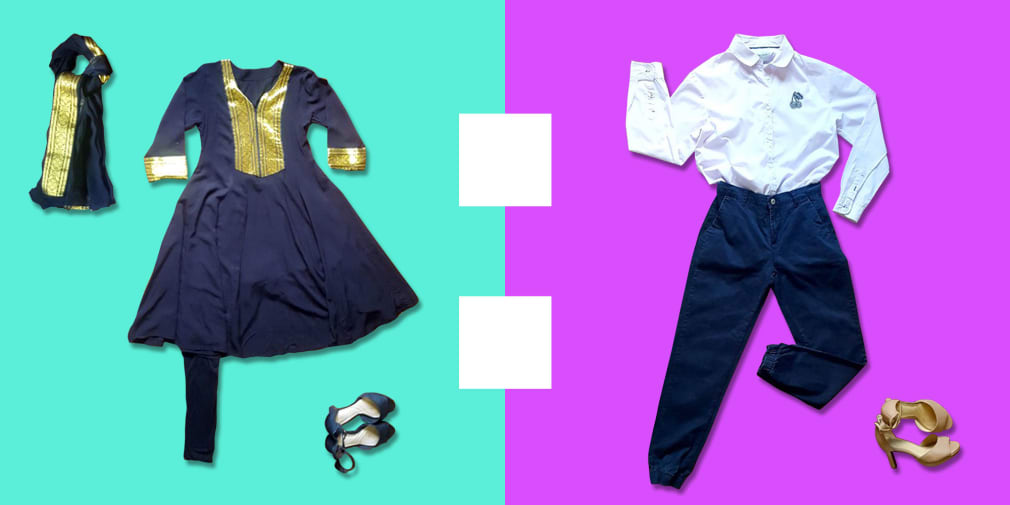Modest Workwear
Project duration: Dec 2021 – Dec 2022
Funded by: AHRC
Project summary
This project pilots a training module that will help participants build new knowledge about the significance of religious and belief-based dress as a workplace factor in secular and faith-based organisations, and for people of all beliefs and none.
The project extends the impact of insights from the AHRC project Modest Fashion in UK Women's Working Life led by Professor Reina Lewis at UAL and Professor Kristin Aune at Coventry University's Centre for Peace, Trust and Social Relations. Our active dissemination activities respond to a pressing need evidenced in our 65 interviews and articulated during our 2020 and 2021 Parliamentary Roundtables.
Religion and Dress at Work - opportunities and pitfalls
This new training module is designed to:
- Assist organisations to identify and address how religion and belief–based dress and other aspects of appearance impact on individuals and affect organisational culture, functionality, and reputation.
- Help employers and organisations mitigate the potential negative impact of workplace modest fashion codes.
- Enable participants in interfaith and intercultural dialogue and policy-making to explore the potential positive impact of modest fashion as a dialogue tool.
We welcome participants who are:
- Managers, HR professionals, and diversity practitioners (including employee network chairs).
- Religious leaders, community leaders, managers and HR professionals working for faith-based organisations
- Policy makers and specialists in interfaith and intercultural dialogue.
Module duration: 90mins-3 hours
Delivery mode: available offline or online
If you would like to host a workshop for your organisation, or join a workshop as an individual, please contact Prof. Reina Lewis, reina.lewis@fashion.arts.ac.uk.
The module is of professional development level, suitable to be evaluated within organisational or sectoral CPD frameworks.
Project team
- Principal Investigator: Prof. Reina Lewis (London College of Fashion, UAL)
- Co-Investigator: Prof. Kristin Aune (Centre for Trust Peace & Social Relations, Coventry University)
- Project Coordinator: Dr Vanessa Pope (London College of Fashion, UAL)
Project aims
- To develop and test training materials to help managers, HR professionals, and equality, diversity and inclusion practitioners better comprehend how organisational requirements for modest dress and behaviour impact on staff experience and organisational performance, reaching participants in UK and global organisations (in the UK and Gulf).
- To support policy and community work concerned with interfaith, faith-secular, and intercultural dialogue by exploring how improved knowledge about the potential advantages and disadvantages of modest dress cultures and behaviours can a) help avoid pitfalls in process and b) generate rich content for dialogue activities.
- To increase understanding of how organisational performance can be enhanced by recognising that organisational culture, functionality, and reputation are affected by how individuals experience workplace modesty requirements (positively or/and negatively, and regardless of personal religious and secular beliefs and practices).
Approach and outputs
Reina Lewis is a highly experienced and widely published researcher with a global profile and media presence as a public intellectual. She is an expert on modest fashion and on the intersection of religious cultures and fashion cultures, with wide ranging industry connections including in the Middle East (one of the still few researchers to have carried out studies in Saudi Arabia).
Having worked in development education and racism awareness training early in her career, and with a constant stream of research community engagement, Reina is adept at managing sensitive discussions. She applies these skills and research insights in her role as University Diversity Champion for Religion and Belief (and chair of UAL’s Religion and Belief Diversity Equality Forum), and in supporting course teams at LCF on their development of anti-racist and inclusive strategies for teaching and learning.
Kristin Aune is an internationally renowned researcher with sociological knowledge on religion and gender and specialisms in both UK Christian religious cultures and approaches to secularism and non-belief. Kristin has developed and delivered training for universities and religious organisations on tackling religion and belief-related harassment (funded by the Office for Students), and on university chaplaincy for higher education professionals and religious leaders (funded by the Church of England). She has also delivered training sessions to women’s and religious groups on responding to domestic abuse, so is experienced in navigating conflicts in group settings such as between gender equality and religious interests
Partners
- British Council, UK
- Zay Initiative
- Jeito Consulting, UK
- Muslim Women's Council, UK
Advisory board
It is the mission of this project to seek to include diverse perspectives; the range of expertise, experience and opinion in our Advisory Board helps us achieve this. The individuals and organisations involved are not responsible for our conclusions; nevertheless, we very much appreciate the generous response of the Advisory Board to the design, delivery and outputs of the project.
- Nadia El-Sebai, Executive Director, The Arab British Centre, UK
- Clive Bane, Director, B3sixty
- Dr. Amélie Le Renard, permanent researcher, CNRS (Centre Maurice Halbwachs), Paris
- Prof. Lucy Vickers, School of Law, Oxford Brookes University
- Dave Perfect, Visiting Professor, University of Chester
- Rachel Guthartz, MSc
- Rabiha Hannan, Trustee of New Horizons in British Islam, UK

